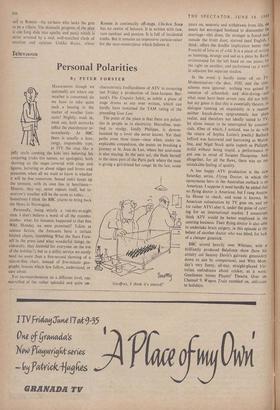Television
Personal Polarities
By PETER FORSTER Personally, being strictly a red-sky-at-night man, I don't believe a word of all the mumbo- jumbo: what, for instance, happened to that fine Whit Monday we were promised? Taken as science fiction, the forecasts have a certain limited charm, resembling What the Stars Fore- tell in the press (and what wonderful things, in- cidentally, they foretold for everyone on the eve of the holiday!), but as a utility service we surely need no more than a five-second showing of a rain-or-line chart, instead of five-minute geo- graphy lessons which few follow, understand, or care about.
For incomprehension on a different level, one marvelled at the rather splendid and quite un- characteristic foolhardiness of ATV in mounting last Friday a production of Jean-Jacques Ber- nard's The Unquiet Spirit, as subtle a piece of stage drama as any ever written, which can hardly have sustained the TAM rating of the preceding Gun Law.
The point of the piece is that there are polari- ties in people as in electricity. Marceline, mar- ried to stodgy, kindly Philippe, is demon- haunted by a lover she never knows Yet their paths cross three times—once when, under in- explicable compulsion, she insists on breaking a journey at St. Jean de Luz, where her soul-mate is also staying. In the next act, she finds herself in the same part of the Paris park where the man is giving a girl-friend her conger. In the last, some 'Geoffrey, 1 think it's started!' years on, neurotic and withdrawn from life, she meets her estranged husband to dismember the marriage—this done, the stranger is found dead outside the front door, starved (and English. I think, offers the double implication better than French) of love as of cold. It is a piece of writing as haunting, strange and sad as a piece by Ravel. orchestrated for the left hand on one piano. for the right on another, and performed (as it were) in adjacent but separate studios.
In the event it hardly came off on TV. Modernisation—the date, 1930, and the time' scheme were ignored: nothing was gained by mention of schnorkels and skin-diving—and what must have been severe cuts, did not hell), but my guess is that this is essentially theatre, its dialogue running on exquisitely in a manner neither knock-down epigrammatic nor plain realist, and therefore not ideally suited to TV, let alone meant to be interrupted by col-miler' cials. (One of which, I noticed, was to do with the return of Sophia Loren's jewels.) Barbara Jefford was harrowed and harrowing as Marce- line, and Nigel Stock quite superb as Philippe stolid without being stupid, a performance to put one in mind of Jacques Dacqmine. And altogether, for all the flaws, there was an un- mistakable feeling of quality.
A less happy ATV production is the new Saturday series, Flying Doctor, in which the eponymous hero in the Australian outback is an American. I suppose it need hardly be added that no flying doctor is American, but I rang Austra- lia House to check, and none is known. So American colonisation by TV goes on, and we (or rather ATV) abet it, under the guise of cater- ing for an international market. I sometimes think ATV would be better employed in the catering business. Their flying doctor is also able to undertake brain surgery, in this episode at the behest of another doctor who was blind, for lack of a cheaper gimmick.
BBC scored heavily over Whitsun, with a brilliantly produced 'Belafonte show (how his artistry cut Sammy Davis's galvanic gimmickry down to size by comparison), and Whit Mon- day's very funny, all-star, straight-played Vic- torian melodrama about cricket, as it were, Gentlemen versus Players' Theatre. Over on Channel 9, Wagon Train rumbled on, oblivious to holidays.










































 Previous page
Previous page